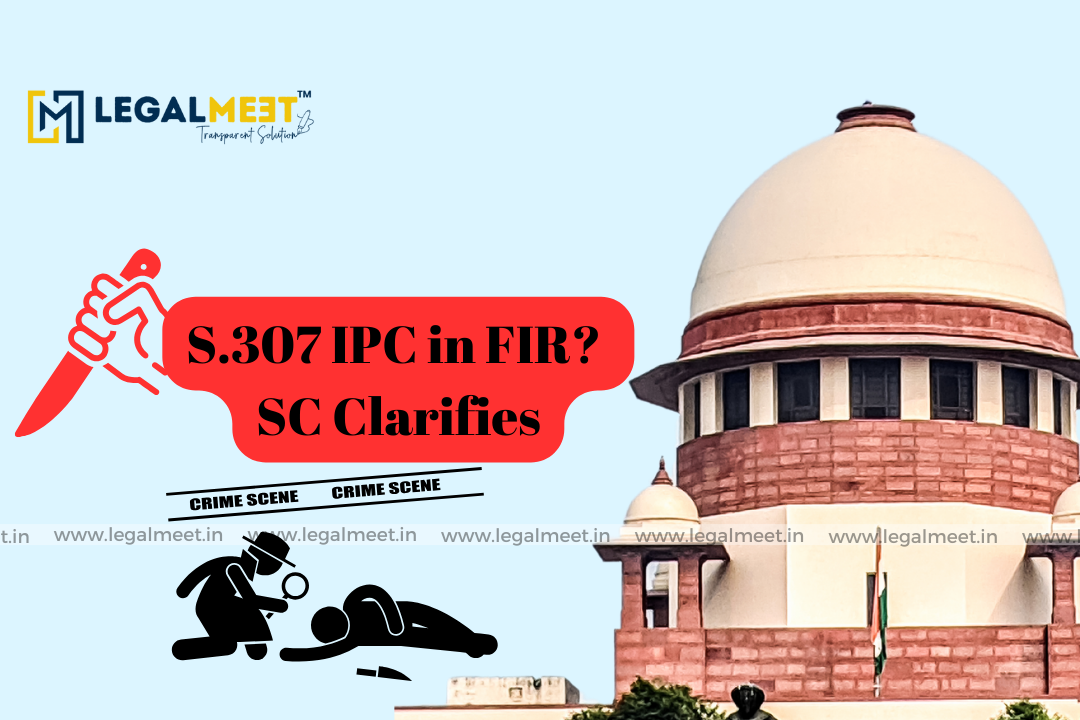
SC: Mere Mention of S. 307 IPC in FIR Doesn’t Bar Quashing if Allegations Don’t Make Out the Offence
The Supreme Court ruled today (February 11) that just because a serious, non-compoundable offence like Section 307 IPC (attempt to murder) is mentioned in an FIR, it does not mean the case cannot be quashed by the High Court if the facts don’t support the charge. The Court explained that even non-compoundable cases can be quashed if a compromise is reached, considering factors like the nature of the offence, the severity of injuries, the accused’s conduct, and the impact on society. The case involved an appeal against the Allahabad High Court's refusal to quash criminal proceedings under Section 307 IPC, despite a compromise between the parties. The appellant argued that the High Court confused “compounding” (which is not allowed for serious offences) with “quashing” of proceedings. The Supreme Court set aside the High Court’s decision, stating that continuing the case would be pointless, especially since it had been pending since 1991 and the injuries were not severe. Relying on the case of Gian Singh vs. State of Punjab and Another reported in (2012) 10 SCC 303, the Court observed that quashing of offence or criminal proceedings on the ground of settlement between an offender and victim is not the same thing as compounding of offence. Relying on cases such as State of Madhya Pradesh vs. Laxmi Narayan and Others (2019) 5 SCC 688 and Narinder Singh and Others vs. State of Punjab and Another (2014) 6 SCC 466, the Court observed that factors like the nature of the offense, the severity of injuries, the accused's conduct, and the impact of the crime on society can justify quashing a non-compoundable case based on a settlement. In Narinder Singh, though the Court observed that Section 307 IPC would fall within the category of cases which cannot be settled, it added that the High Court should still examine if the addition of S.307 IPC was justifiable from the allegations. The judgment quoted the observations from Narinder Singh as follows : "However, the High Court would not rest its decision merely because there is a mention of Section 307 IPC in the FIR or the charge is framed under this provision. It would be open to the High Court to examine as to whether incorporation of Section 307 IPC is there for the sake of it or the prosecution has collected sufficient evidence, which if proved, would lead to framing the charge under Section 307 IPC. For this purpose, it would be open to the High Court to go by the nature of injury sustained, whether such injury is inflicted on the vital/delicate parts of the body, nature of weapons used, etc. However, such an exercise by the High Court would be permissible only after the evidence is collected after investigation and the charge-sheet is filed/charge is framed and/or during the trial. Such exercise is not permissible when the matter is still under investigation." It was reiterated in Laxmi Narayan (supra), that the mere mention of Section 307 IPC in the FIR or the charge-sheet should not be the basis for adopting a hands-off approach. Coming to the facts of the present case, the Court noted that the invocation of S.307 IPC was not justifiable. The specific act of firing was attributed to one accused, who has since died. The allegations against the appellants are general and vague in nature. The Court held that considering the injury and the nature of the weapon used, certainly no offence under Section 307 IPC is made out. “We are also inclined to conclude that considering the overall circumstances, the nature of the weapon and the nature of the injury (fracture of the head of distal phalanx of left ring finger), the offence alleged, on facts, does not fall in that category of cases where the court should deny relief in the event of a settlement. At the highest, the offence alleged could be one under Section 326 of IPC. It could not be said, on facts, considering all the circumstances that this is a crime which has such an harmful effect on the public and that it has the effect of seriously threatening the well-being of the society. We make it clear that we are saying so on the facts of the present case. We are also firmly of the opinion that proceeding with the trial, when parties have amicably resolved the dispute in the present case, would be futile and the ends of justice require that the settlement be given effect to by quashing the proceedings. It would be a grave abuse of process to let this trial remain pending under the above circumstances, particularly when the dispute is settled and resolved.”, the court observed. “Considering the special features of the case and taking the settlement on record and applying the law, we find that this is a fit case where proceedings in complaint case No. 8023 of 2015 arising out of Case Crime No. 248 of 1991 pending in the Court of Additional Chief Judicial Magistrate, Court No.5, Moradabad should be quashed.”, the court added. Accordingly, the appeal was allowed. Case Title: Naushey Ali & Ors. Versus State of U.P. & Anr. www.legalmeet.in
